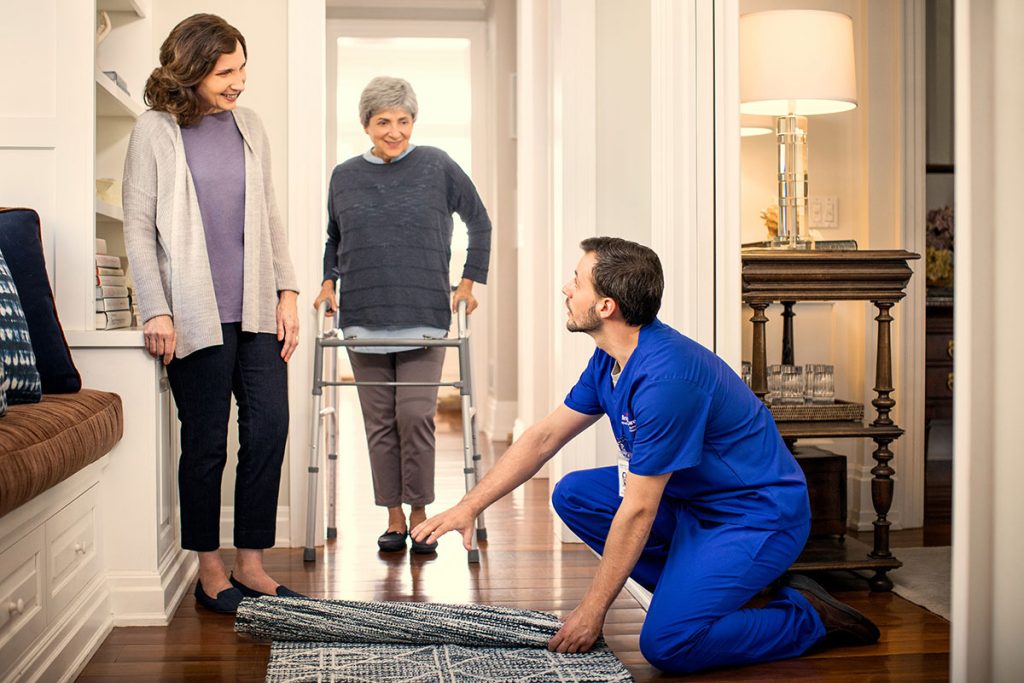As we grow older, our homes should be a place of comfort and security. However, as we age, the risk of accidents at home increases. Simple tasks can become challenging, and hazards that were once unnoticed can pose serious risks. Here are some practical tips to make your home safer and help prevent accidents.
Understanding the Risks
Falls are the most common accidents among seniors, but other risks include fires, burns, poisoning, and accidents related to poor lighting or clutter. By taking steps to address these risks, you can make your home a safer place.
Preventing Falls
1. Remove Clutter: Keep floors clear of clutter like papers, shoes, and other items. This reduces the risk of tripping.
2. Secure Rugs: Use double-sided tape or non-slip mats to secure rugs. Loose rugs can easily cause slips and falls.
3. Install Handrails and Grab Bars: Place handrails on both sides of stairs and grab bars in bathrooms, especially near the toilet and in the shower or bathtub.
4. Improve Lighting: Ensure all areas of your home, especially stairways and hallways, are well-lit. Use nightlights in bedrooms and bathrooms.
5. Wear Proper Footwear: Avoid slippers and socks that can slip. Wear shoes with non-slip soles even when indoors.
6. Exercise Regularly: Regular physical activity helps maintain strength, balance, and flexibility. Activities like walking, yoga, or tai chi can be very beneficial.
7. Review Medications: Some medications can cause dizziness or weakness. Talk to your doctor about the side effects of your medications.
Fire and Burn Prevention
1. Install Smoke Alarms: Place smoke alarms on every level of your home, inside bedrooms, and outside sleeping areas. Test them monthly and replace batteries yearly.
2. Use Appliances Safely: Turn off electrical appliances when not in use. Avoid using space heaters and electric blankets while sleeping.
3. Be Careful in the Kitchen: Use a timer when cooking and never leave food unattended on the stove. Keep flammable items like towels away from the stove.
4. Set Water Heater Temperature: Lower your water heater temperature to 120°F (49°C) to prevent scalding burns.
5. Have a Fire Escape Plan: Plan and practice a fire escape route. Ensure you can easily unlock and open doors and windows.
Poisoning Prevention
1. Store Medications Safely: Keep all medications in their original containers and properly labeled. Use a pill organizer to keep track of your daily medications.
2. Avoid Mixing Medications: Always check with your doctor or pharmacist before mixing medications.
3. Store Chemicals Properly: Keep cleaning products and chemicals out of reach, in a well-ventilated area. Never mix cleaning products as they can create dangerous fumes.
4. Install Carbon Monoxide Detectors: Place carbon monoxide detectors near sleeping areas and check them regularly.
Enhancing Bathroom Safety
1. Use Non-Slip Mats: Place non-slip mats in the shower, bathtub, and on bathroom floors to prevent slipping.
2. Install a Shower Chair: A shower chair can provide stability while bathing. Consider a handheld showerhead for easier use.
3. Keep Essentials Within Reach: Store toiletries and towels within easy reach to avoid stretching or bending too far.
4. Check Water Temperature: Test water temperature before entering the shower or bathtub to avoid burns.
Improving Mobility
1. Use Assistive Devices: Canes, walkers, and wheelchairs can provide additional support. Ensure they are properly adjusted to your height.
2. Rearrange Furniture: Arrange furniture to create clear, wide pathways throughout your home.
3. Install Ramps: If you use a wheelchair or have difficulty with stairs, consider installing ramps.
Addressing Vision and Hearing
1. Regular Check-Ups: Have your vision and hearing checked regularly. Update prescriptions for glasses and hearing aids as needed.
2. Enhance Lighting: Use high-wattage bulbs and consider adding task lighting in areas where you read or do detailed work.
3. Reduce Glare: Use curtains or blinds to reduce glare from windows. Place lamps to minimize glare on tasks and screens.
Emergency Preparedness
1. Keep a Phone Nearby: Always have a phone within reach in case of emergencies. Consider carrying a mobile phone with you.
2. Emergency Contacts: Keep a list of emergency contacts by each phone and in your wallet. Include family, friends, neighbors, and medical professionals.
3. Medical Alert Systems: Consider a medical alert system that can call for help at the push of a button.
General Safety Tips
1. Label and Organize: Clearly label and organize items in your home. This reduces the time spent searching for items and minimizes the risk of accidents.
2. Regular Maintenance: Keep your home in good repair. Fix loose floorboards, replace burnt-out bulbs, and repair any leaks promptly.
3. Stay Connected: Maintain regular contact with family and friends. A daily check-in can ensure someone is aware of your well-being.
Making Each Room Safer
1. Living Room:
- Arrange furniture to allow easy movement.
- Remove low furniture and electrical cords from pathways.
- Ensure chairs and sofas are at a comfortable height.
2. Bedroom:
- Keep a flashlight within reach of your bed.
- Use a bed rail for added stability when getting in and out of bed.
- Have a phone close to your bed.
3. Kitchen:
- Store frequently used items at waist level to avoid bending or reaching.
- Use a step stool with a handrail for reaching high shelves.
- Keep sharp objects like knives securely stored.
4. Bathroom:
- Install a raised toilet seat for easier access.
- Use lever-style faucets which are easier to operate than traditional ones.
- Ensure the bathroom floor is dry and free of soap residue.
Conclusion
Creating a safe home environment is crucial for seniors to maintain their independence and well-being. By taking proactive steps to prevent accidents, you can enjoy the comfort of your home with peace of mind. Remember, safety doesn’t happen by accident – it requires awareness and action. By following these tips, you can significantly reduce the risk of accidents and create a safer living space for yourself or your loved ones. Stay safe, and take care!


